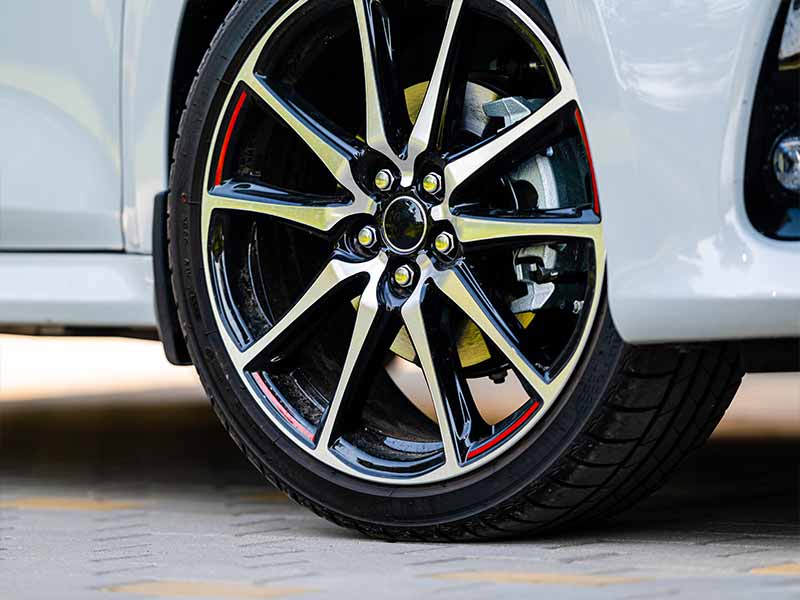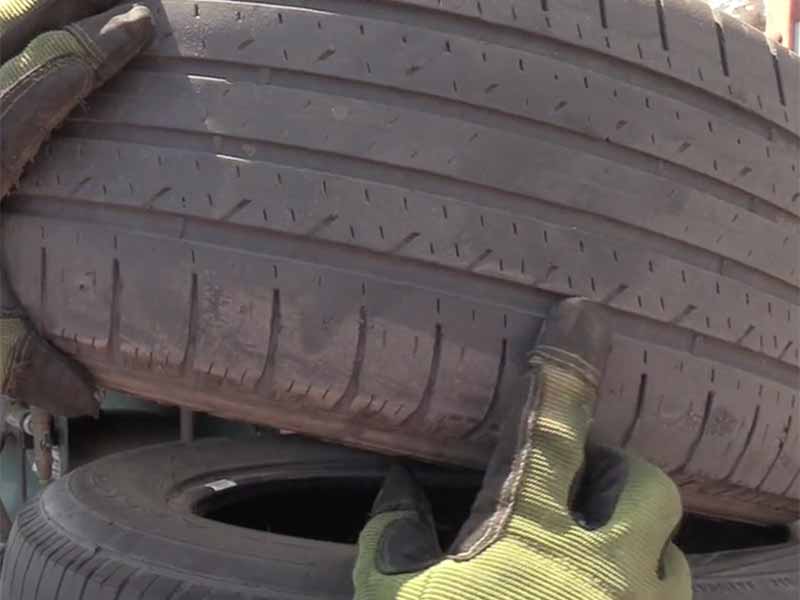A few different mechanical problems can cause steering wheel vibration issues, but one cause that often gets overlooked is poor alignment.
Can Alignment Cause Vibration?
Yes, poor wheel alignment can cause vibrations that can be felt through the steering wheel and seat bottom. It can also indirectly cause steering wheel vibration by causing uneven tire wear. However, there are other more likely causes.
Misaligned wheels can cause all sorts of vibrations that can make your drive a real pain. In this article, we’ll dive into why alignment issues can cause vibrations and what you can do about it.
Let’s take a closer look.
Can Alignment Cause Vibration At High Speeds?
Poor alignment can certainly cause steering wheel vibrations. However, it’s important to note that poor alignment is not the only cause of steering wheel vibrations. If your wheels aren’t aligned correctly, they may be pointed in different directions, which can cause the car to pull or vibrate.

An out-of-balance wheel is another common cause of steering wheel vibrations. When a wheel is out of balance, it means the weight distribution is uneven, and this can cause the wheel to wobble as it rotates. This can be caused by a variety of things, including worn-out suspension components, tire issues, or even something as simple as a loose lug nut.
Can Alignment Cause Shaking When Braking?
When your car is aligned correctly, all four tires should be pointed straight ahead, and the wheels should be perpendicular to the road.
If your alignment is off, it can cause your car to pull to one side or the other, leading to a vibration when you apply the brakes. This is because the braking forces are applied unevenly to the tires, causing the steering wheel to shake or vibrate.
However, there are many other causes of vibrations when braking, such as warped brake rotors or worn brake pads, uneven tire wear, or a bent rim.

When pressing the brake pedal, the most common cause of a shaking steering wheel is warped brake rotors. As the brake pads contact the brake discs, a pulsing effect occurs. The front wheels do most of the stopping in a braking system, so it’s very common to feel this pulsing as shaking in the steering wheel.
Can Bad Alignment Cause Vibration When Accelerating?
If you’re experiencing vibration while accelerating in your vehicle, there are several potential causes to consider. One of these causes could be a bad alignment. However, vibrations due to wheel alignment problems should be felt more or less all the time and not just during acceleration.
Another common cause is a problem with the wheel balance. If one or more of your tires is heavier in one spot, it can cause the wheel to wobble and create a vibration. Worn suspension components, such as shocks or struts, can also cause vibrations when accelerating. Additionally, problems with the drive shaft or wheel bearing can lead to vibrations.

Another possible cause of vibration when you’re accelerating is engine problems. Misfires due to old spark plugs, failing ignition coils, fueling problems, and other engine issues can lead to a vibration that is actually caused by the motor and not the wheels, tires, brakes, or suspension parts. These types of vibrations will be felt more through the car as a whole and not just the steering wheel.
Can Uneven Tire Wear Cause Vibration?
One of the most common causes of vibration in a vehicle is uneven tire wear. Tires can wear unevenly for many reasons, such as overinflation, underinflation, or misalignment. When your tires are worn unevenly, it creates an imbalanced and unstable driving experience, which can result in noticeable vibration, especially at higher speeds.
To avoid this, it’s important to keep an eye on your tire tread and make sure your tires are properly inflated and aligned. If you notice any significant difference in the wear pattern of your tires, it’s time to get them checked by a professional. They can examine your tires, assess the cause of the uneven wear, and provide recommendations on what to do next.

Other Causes Of Steering Wheel Shake And Vibrations?
There are a few different things that can cause your vehicle’s steering wheel to shake and vibrate, and it’s important to figure out what’s behind the problem. Here are some of the most common culprits:
Unbalanced Tires And Wheels
If one or more of your tires are not balanced properly, it can cause the steering wheel to shake or vibrate, especially at higher speeds. This is especially true for your front tires. Although rear tires can also cause car shaking, the shaking won’t be isolated to the steering wheel.
Uneven Tire Wear
If your tires are wearing down unevenly, it can cause the vehicle to vibrate. This can be caused by misaligned wheels, overinflated or underinflated tires, or even worn suspension components.
Brake Problems
Issues with your brakes can also lead to steering wheel vibrations. Worn rotors or brake pads, for example, can cause the steering wheel to shake or vibrate when you brake.
Worn Suspension Components
Your vehicle’s suspension system is what helps to keep your tires in contact with the road. If any of the components are worn or damaged, it can cause the steering wheel to shake or vibrate, especially over a rough road surface or while cornering.
Also, damaged or worn suspension parts can make it impossible for your alignment to be correct. And as we’ve already discussed, alignment issues can lead to vibrations.
Resources
Below are some links you may find helpful when learning about tires
- Diagnosing a shaking steering wheel – Delphi Auto Parts
- 5 reasons why your steering wheel might be shaking – Chapel Hill Tire
Final Thoughts
Alignment can certainly be a cause of steering wheel or driver’s seat vibrations, but it’s not always the sole issue. Several other factors can cause vibrations, such as tire imbalances, worn suspension components, or even brake problems.
It’s always a good idea to have a professional diagnose the cause of any steering wheel or seat vibrations. That way, you can get the right solution and return to a smooth, comfortable ride.
If you’re experiencing vibrations, don’t ignore them! Get them checked out as soon as possible to ensure the safety and longevity of your vehicle.
Good luck and happy motoring.





